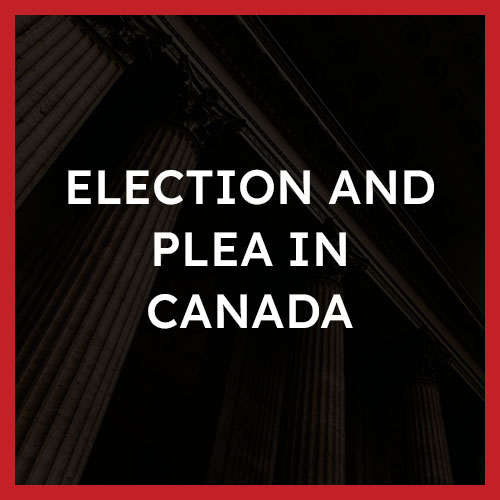The Stages of a Criminal Trial in Canada

A trial is a formal court process by which a judge or jury determines your legal guilt or innocence. If you are found guilty at trial, a sentencing hearing will then occur to determine your punishment.
Where your trial takes place and in front of whom (by judge only or by judge and jury) will depend on the nature of the charge, and the subsequent elections made by the Crown and defence.
For more information, see the general plea and election FAQ.
The Three Fundamental Principles Governing Criminal Trials
The criminal trial process is governed by three fundamental principles:
- The presumption of innocence, which means that you are innocent until proven guilty by the prosecution. In practice this means that everyone has a right to a trial if they choose to exercise that right.
- You have the right against self-incrimination. This means you do not have to speak to the police or give testimony in court. The judge or jury are not allowed to weigh the fact that you did not testify against you or infer guilt from your silence.
- The ultimate burden is on the Crown to prove guilt beyond a reasonable doubt. It is not necessary to prove your innocence at trial, only to show that there is a reasonable doubt as to your guilt.
Criminal Trial Process
There are three main stages in the criminal trial process:
1. The Crown Prosecutors Case
The trial begins with the Crown Prosecutor presenting his or her case to the judge. This includes calling their witnesses and introducing evidence.
The Crown will attempt to prove guilt beyond a reasonable doubt. Your criminal defence lawyer will then have an opportunity to cross-examine witnesses to cast doubt on the Crown’s evidence and raise a reasonable doubt as to your guilt.
2. The Defence’s Case
Next, the defence has the option to call their own witnesses and evidence to support your side of the story. As the accused, you will have the opportunity to take the stand, but cannot be forced to do so.
The Crown will be provided an opportunity to cross-examine any witnesses the defence calls, including you, should you choose to testify. Like the defence, the goal of the Crown is to cast doubt on your side of the story.
3. Final Arguments and Decision
Lastly, final arguments will be made by both Crown and defence. Once complete, the judge may make his or her decision immediately. Often however, the judge will require some time to decide, and will adjourn the trial until he or she is ready.
A decision may be delivered orally or in writing and will indicate a date for a sentencing hearing, if required.
Role of the Accused
One of the most important first steps as the accused is to ensure you have a dedicated, experienced defence lawyer on your side.
This will reduce both your stress and your role in the trial as your lawyer zealously advocates for you.
During a criminal trial, the accused has the option to give testimony, but does not need to. Often, your lawyer will strategically decide whether to put you on the witness stand.
If an accused person does not take the stand, the judge or jury is not allowed to draw any negative inferences from that.
Even if you do not intend to testify, the accused is almost always required to attend their trial. Therefore, you should make every effort to remember your trial date and attend as required.
Do I have to take the stand in my own trial?
In Canada we have a constitutionally protected right to silence which guarantees that we will never be required to take the stand in our own trial. You are, however, free to testify in your own defence if you wish, and there certainly are situations where you will need to take the stand in order to advance a particular defence. For example, you may have to take the stand if your defence requires you to provide testimony about your mental state at the time of the offence.
However, if you do not need to take the stand you should avoid doing so. Taking the stand will open you up to cross examination by the Crown Prosecutor and will put you in a situation where you have to answer questions that can undermine your defence. Your lawyer will advise you as to whether it is prudent to take the stand in your case, and you should follow his or her recommendation
If you do choose to take the stand at your trial, you will have to be examined by your lawyer during a direct examination, and you will then be examined by the Crown Prosecutor during a cross examination.
In the direct examination, you will take the stand and your lawyer will ask you open ended questions designed to present your side of the story in a manner that will assist your defence. During cross examination, the Crown Prosecutor will be asking you closed ended questions designed to undermine your credibility and damage your defence. Because cross examination is often a very stressful experience that can potentially weaken your case, it may be best to avoid taking the stand where possible. If you do need to, or want to take the stand in your own trial, one of our lawyers will be able to use their strong trial advocacy skills to fully prepare you, and to ensure that you make the best possible presentation of your case.
Tips for Taking the Stand
If you anticipate taking the stand at your trial, or even if you do not, consider the following tips on how to prepare for your day of trial.
- Listen to your lawyer. Your lawyer has experience and skills they have gained through extensive education and through real life experience running criminal trials. If they advise you to do or avoid doing certain things, this advice is being given solely for the purpose of ensuring your success at trial. Listen to it!
- If you have not already done so, make a written statement about the events surrounding the alleged charge. Writing the statement will give you something to review prior to trial that will help you keep memories of the event fresh in your mind. The better you are able to remember the events as they occurred, the clearer and the more credible your responses will be.
- Stay calm. Taking the stand can be a very nerve wracking experience that may not only make you nervous, but that can make you feel angry when being cross-examined by the Crown Prosecutor. Often the questions that are being asked are designed to, and will make you feel enraged and can cause you to react poorly. If you respond in a hostile or overly defensive manner, your behaviour may have a negative impact on the way that the judge perceives you.
- Tell the truth. If you are taking the stand it is of utmost importance that you tell the truth while you are testifying, even if you think the answer could damage your defence. If you lie and you are caught, not only will you damage your credibility and your defence, but you can also be charged with perjury, another very serious criminal offence.
About The Author
Ask A Question
We endeavor to respond to questions within 24 hours. If your matter is urgent, please call our office or submit a request for a free consultation.






